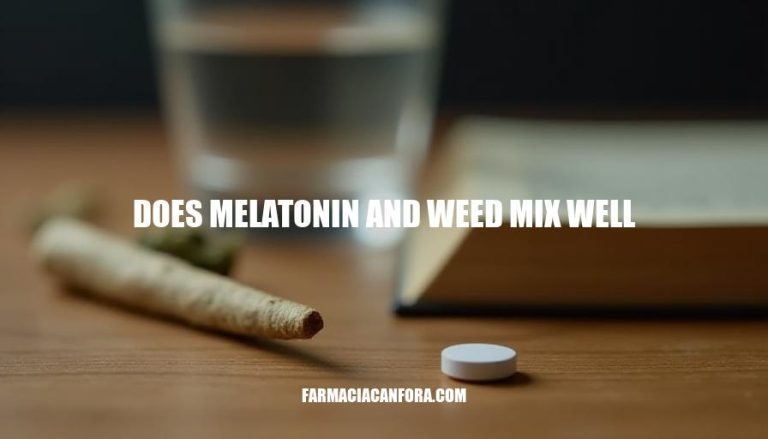


Melatonin is a hormone that helps us fall asleep. It’s made by our brain. Weed has chemicals that affect how we feel and sleep too.
Some people mix melatonin and weed to help them sleep better or deal with insomnia. But it’s really important to understand what happens when you combine these two, because the effects can be different for everyone.
Melatonin, a hormone produced by the pineal gland in the brain, plays a crucial role in regulating sleep-wake cycles, also known as circadian rhythms. It signals the body when it’s time to sleep and wake up. During the evening, melatonin levels rise, promoting sleepiness and helping the body transition into sleep.
Conversely, in the morning, melatonin levels decrease, making you feel more alert and awake.
Melatonin supplements are often used to treat sleep disorders, such as insomnia and jet lag, by helping to adjust the body’s internal clock. They can also be beneficial for individuals with delayed sleep phase disorder or those who work night shifts.
However, melatonin supplements can have potential side effects. Common side effects include daytime drowsiness, dizziness, and headaches.
Some people may also experience vivid dreams or nightmares. Less commonly, melatonin can cause mood changes, such as feelings of depression or irritability. Additionally, melatonin can interact with certain medications, such as blood thinners, immune suppressants, and diabetes medications, potentially causing adverse effects.
It’s important to consult with a healthcare provider before starting melatonin supplements, especially if you are pregnant, nursing, have a medical condition, or are taking other medications.
Weed, also known as marijuana or cannabis, has a range of effects on both the body and mind. The primary psychoactive compound in weed is THC (tetrahydrocannabinol), which is responsible for the “high” sensation. When consumed, THC stimulates the brain’s pleasure centers, releasing dopamine and creating feelings of euphoria and relaxation.
Medicinally, weed is used to alleviate symptoms of various conditions.
It can help with chronic pain, nausea from chemotherapy, multiple sclerosis, and epilepsy. CBD (cannabidiol), another compound in cannabis, is non-intoxicating and has potential medicinal benefits for conditions like anxiety and epilepsy. However, the medicinal use of weed is still under research, and its efficacy varies depending on the condition being treated.
Recreationally, weed is used for its mind-altering effects.
People consume it to relax, enhance sensory experiences, and socialize. The effects can vary based on the method of consumption. Smoking or vaping weed leads to rapid onset of effects, while edibles take longer to kick in but last longer.
Potential side effects of weed include changes in blood pressure, increased heart rate, dizziness, drowsiness, and gastrointestinal disturbances.
It can also impair respiratory function, especially with chronic use. Psychologically, weed can cause anxiety, paranoia, and in high doses, psychosis. Long-term use may increase the risk of developing mood disorders and, in some cases, schizophrenia.
Weed’s impact on the body and mind is complex and varies from person to person.
While it offers potential medicinal benefits, it also carries risks, particularly with recreational use.
Melatonin, a hormone produced by the pineal gland, regulates sleep-wake cycles. Cannabis, containing compounds like THC and CBD, interacts with the endocannabinoid system, influencing sleep, mood, and appetite. Combining melatonin and cannabis is generally considered safe, but individual responses vary.
Research on the interaction between melatonin and cannabis is limited.
Some studies suggest that combining these substances may enhance sleep quality, as both have sedative effects. However, potential risks include altered circadian rhythms and reduced effectiveness of melatonin due to faster metabolism when combined with cannabis.
Benefits of combining melatonin and cannabis may include improved sleep onset and duration, especially for those with sleep disorders. However, more research is needed to fully understand the long-term effects and safety of this combination.
:
:
:
Medical professionals generally consider both melatonin and cannabis safe for consumption, but combining them should be approached with caution. Melatonin is a hormone that regulates sleep, while cannabis contains cannabinoids like THC and CBD that interact with the body’s endocannabinoid system. Some experts suggest that combining melatonin and cannabis may help improve sleep onset and duration, but it can also lead to excessive drowsiness, vivid dreams, and potential dependency.
Recommendations include avoiding driving or operating heavy machinery when using them together, limiting their use to a few nights per week, and being mindful of individual responses to each substance. More research is needed to fully understand the long-term effects and safety of this combination.
Melatonin, a hormone produced by the pineal gland, regulates sleep-wake cycles, while cannabis interacts with the endocannabinoid system, influencing sleep, mood, and appetite.
Combining melatonin and cannabis is generally considered safe, but individual responses vary. Research on their interaction is limited, suggesting potential benefits include improved sleep onset and duration, especially for those with sleep disorders.
However, more research is needed to fully understand the long-term effects and safety of this combination. Medical professionals recommend approaching caution when combining these substances, avoiding driving or operating heavy machinery, limiting use to a few nights per week, and being mindful of individual responses.
It is essential to consult with a healthcare provider before mixing melatonin and cannabis, especially if you have a medical condition, are pregnant, nursing, or taking other medications.